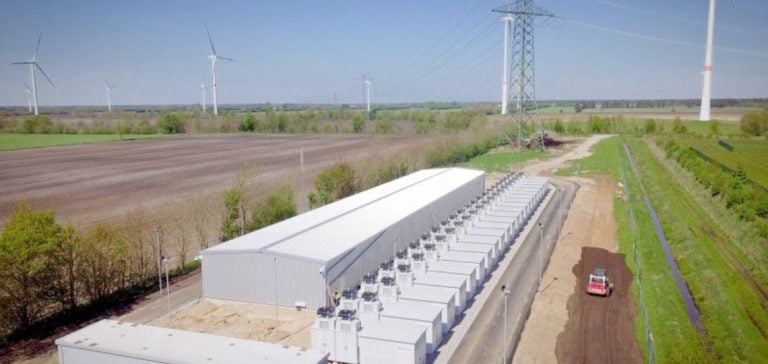In 2024, Germany has increased the capacity of batteries connected to its electricity grid by 30%.
This increase is intended to compensate for fluctuations caused by the rise in renewable energies, which supplied 60% of the country’s electricity in the first half of the year. The government wants this share to reach 80% by 2030, but to achieve this, increased storage capacity is essential.
At present, no official targets for storage infrastructure have been set by Berlin, leaving companies free to direct investment and development.
This increase in storage capacity stems from the desire to secure the electricity supply despite the production variations inherent in wind and solar power.
Batteries are used to store energy when electricity prices are low, or even negative, and redistribute it when prices rise.
This not only stabilizes the grid, but also reduces price peaks on the wholesale market.
Massive investments and new facilities
The battery storage boom is being driven by German and international companies.
British company VPI, backed by Vitol, has announced a 450 million euro investment in energy storage projects mainly located in Germany’s windy north-east.
The Technical University of Aachen has revealed that further battery projects, totalling 3.7 GWh, are in the pipeline between now and 2027.
Among local companies, RWE stands out with plans to add 235 MWh to its Hamm and Neurath power plants in North Rhine-Westphalia before the end of the year.
These projects illustrate the industrial sector’s commitment to the energy transition, while benefiting from new government measures that reduce taxes and speed up plant commissioning approvals.
A market driven by government incentives
The German Ministry of Economic Affairs has encouraged this increase in storage capacity by reducing costs and simplifying procedures.
The aim is to encourage the rapid ramp-up of battery infrastructures, which are essential to support the transition to a power grid powered mainly by renewable sources.
Expanding storage capacity is a key component in supporting the country’s decarbonization objective.
Companies in the energy sector, both local and foreign, find Germany a fertile ground for developing innovative technological solutions aimed at stabilizing the grid and meeting the energy system’s growing need for flexibility.
An industrial and financial challenge
While Germany is making rapid progress in increasing its battery capacity, the road ahead remains fraught with challenges.
The sector has to reconcile the need for rapid transition with significant industrial and financial constraints.
However, government incentives and growing demand for storage offer promising prospects for the years ahead.
The transformation of Germany’s energy landscape now hinges on the ability to build robust storage infrastructures and maximize their use to ensure a stable, reliable power grid, while integrating more and more renewable sources.
The role of batteries in this transition will only grow as Germany moves closer to its 2030 targets.






















